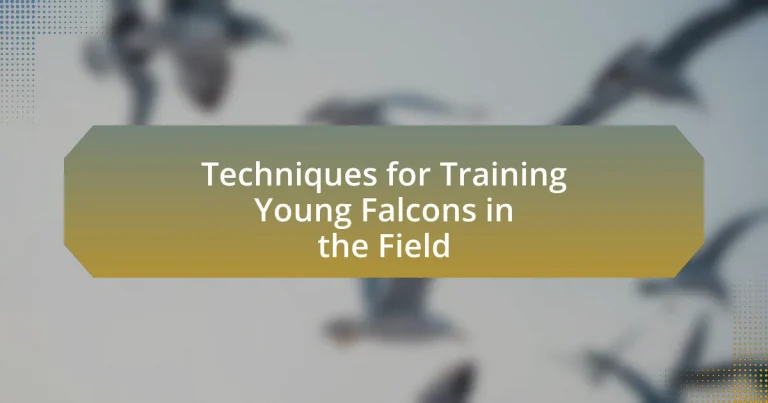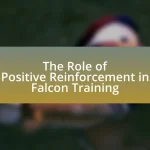The article focuses on the fundamental techniques for training young falcons in the field, emphasizing the importance of positive reinforcement, consistent handling, and gradual exposure to hunting scenarios. It outlines how training methods differ between young and adult falcons, highlighting the unique challenges faced when working with younger birds, such as establishing trust and managing natural instincts. The article also discusses the role of the environment in training, the significance of rewards, and best practices for ensuring the health and safety of young falcons throughout the training process. Additionally, it provides insights into adapting training techniques based on individual falcon needs and available resources for trainers seeking to enhance their methods.
What are the fundamental techniques for training young falcons in the field?
The fundamental techniques for training young falcons in the field include the use of positive reinforcement, consistent handling, and gradual exposure to hunting scenarios. Positive reinforcement involves rewarding the falcon with food or praise when it performs desired behaviors, which encourages learning and builds a strong bond between the falcon and the trainer. Consistent handling ensures that the falcon becomes accustomed to human interaction, reducing stress and promoting trust. Gradual exposure to hunting scenarios allows the falcon to develop its natural hunting instincts in a controlled environment, enhancing its skills and confidence. These techniques are supported by the principles of falconry, which emphasize the importance of building a relationship based on trust and understanding between the falcon and the trainer.
How do these techniques differ from training adult falcons?
Techniques for training young falcons differ significantly from those used for adult falcons primarily due to the developmental stage and learning capacity of the birds. Young falcons are more impressionable and require a gentler, more gradual approach that focuses on building trust and establishing a bond, whereas adult falcons, having already developed their instincts and behaviors, often necessitate more assertive training methods that reinforce established skills and correct unwanted behaviors. This distinction is crucial because young falcons are still forming their responses to stimuli, making positive reinforcement and consistent exposure to training environments essential for their development, while adult falcons may respond better to techniques that leverage their existing knowledge and experience.
What specific challenges arise when training young falcons?
Training young falcons presents specific challenges such as establishing trust, managing their natural instincts, and ensuring consistent feeding. Young falcons, being wild animals, require a strong bond with their trainer to facilitate effective learning; without this trust, they may resist training efforts. Additionally, their instinctual behaviors, such as hunting and flying, can interfere with training sessions, making it difficult to maintain focus on commands. Consistent feeding is crucial, as it helps reinforce positive behavior and encourages the falcon to engage during training. These challenges necessitate a careful and patient approach to successfully train young falcons in the field.
How does the age of the falcon influence training methods?
The age of the falcon significantly influences training methods, as younger falcons require different approaches compared to older ones. Young falcons, typically under one year old, are more impressionable and responsive to positive reinforcement techniques, such as food rewards, which help establish trust and encourage desired behaviors. In contrast, older falcons may have established habits and require more structured training methods, including the use of consistent commands and the introduction of challenges to stimulate their problem-solving abilities. Research indicates that younger birds benefit from gradual exposure to various stimuli, while older birds may need more intensive training sessions to adapt to new environments or tasks.
What role does the environment play in training young falcons?
The environment plays a crucial role in training young falcons by providing the necessary conditions for their development and hunting skills. Natural habitats, such as open fields and wooded areas, offer diverse terrains that help young falcons learn to navigate and hunt effectively. Additionally, the presence of live prey in these environments encourages instinctual behaviors, allowing falcons to practice their hunting techniques in real-world scenarios. Research indicates that exposure to varied environmental stimuli enhances the cognitive and physical abilities of young falcons, ultimately leading to more successful training outcomes.
How can trainers create an optimal training environment?
Trainers can create an optimal training environment by ensuring a safe, distraction-free space that mimics the falcon’s natural habitat. This approach allows young falcons to feel secure and encourages natural behaviors essential for their development. Research indicates that environments resembling their natural settings enhance learning and adaptation, as young falcons are more likely to engage in instinctual activities when they feel comfortable. Additionally, incorporating varied stimuli, such as different perches and training aids, can further stimulate their interest and promote effective learning.
What natural behaviors should trainers consider during training?
Trainers should consider the natural hunting instincts and social behaviors of young falcons during training. These birds exhibit innate predatory behaviors, such as stalking and chasing, which can be harnessed to enhance training effectiveness. Additionally, young falcons are social creatures that benefit from interactions with their peers, as this can improve their learning and adaptability in the field. Recognizing these behaviors allows trainers to create training scenarios that align with the falcons’ natural tendencies, ultimately leading to more successful outcomes in their development and performance.
What are the key stages in the training process for young falcons?
The key stages in the training process for young falcons include imprinting, basic training, and advanced training. Imprinting occurs when the young falcon is exposed to its handler, establishing a bond that is crucial for future training. Basic training involves teaching the falcon to respond to commands and to associate the handler with food rewards, which reinforces desired behaviors. Advanced training focuses on honing hunting skills, including flight training and the use of lures, to prepare the falcon for fieldwork. Each stage is essential for developing a well-trained falcon capable of performing in hunting scenarios.
What initial steps should trainers take when starting the training process?
Trainers should begin the training process for young falcons by establishing a strong bond with the bird. This initial step is crucial as it fosters trust and comfort, which are essential for effective training. Building this relationship can involve spending time with the falcon in a calm environment, offering food rewards, and allowing the bird to acclimate to the trainer’s presence. Research indicates that positive reinforcement techniques significantly enhance learning outcomes in birds of prey, as they respond better to training when they feel secure and connected to their trainer.
How can trainers assess the progress of young falcons throughout training?
Trainers can assess the progress of young falcons throughout training by observing their flight performance, hunting skills, and responsiveness to commands. Flight performance can be evaluated through the falcon’s ability to fly long distances, maintain speed, and execute turns, which indicates physical conditioning and training effectiveness. Hunting skills are assessed by monitoring the falcon’s success rate in capturing prey, reflecting its instinctual development and training outcomes. Responsiveness to commands is measured by the falcon’s reaction to cues during training sessions, showcasing its learning and adaptability. These assessment methods provide concrete indicators of a falcon’s training progress and overall development.
How can trainers effectively use rewards in the training process?
Trainers can effectively use rewards in the training process by implementing a system of positive reinforcement that encourages desired behaviors in young falcons. This approach involves providing immediate and specific rewards, such as food or praise, right after the falcon exhibits the desired behavior, which strengthens the association between the behavior and the reward. Research indicates that immediate reinforcement is crucial for effective learning, as it helps the falcon understand which actions are being rewarded. For instance, a study published in the Journal of Avian Biology found that consistent and timely rewards significantly improved the training outcomes for raptors, demonstrating that trainers who utilize this method can enhance the learning experience and foster better performance in young falcons.
What types of rewards are most effective for young falcons?
The most effective rewards for young falcons are food-based incentives, particularly whole prey items like day-old chicks or quail. These rewards are crucial in training as they align with the natural hunting instincts of the falcons, reinforcing desired behaviors during training sessions. Research indicates that using food rewards enhances learning and retention in raptors, as they are motivated by the instinctual drive to hunt and consume prey.
How does the timing of rewards impact training outcomes?
The timing of rewards significantly influences training outcomes by enhancing the association between the desired behavior and the reinforcement. Immediate rewards following a specific action strengthen the learning process, as they create a clear connection in the falcon’s mind between the behavior and the positive outcome. Research indicates that animals, including falcons, learn more effectively when rewards are given promptly after the desired behavior, as this timing helps to solidify the behavior in their memory. For instance, studies in animal training show that a delay in reward can lead to confusion and a weaker association, ultimately hindering the training effectiveness.
What common mistakes should trainers avoid when training young falcons?
Trainers should avoid overexerting young falcons during training sessions. Overexertion can lead to physical stress and burnout, which negatively impacts the bird’s development and willingness to engage in training. Additionally, trainers must not neglect the importance of gradual exposure to various environments and stimuli; sudden changes can overwhelm young falcons and hinder their adaptability. Furthermore, failing to establish a consistent training schedule can disrupt the learning process, as young falcons thrive on routine. Lastly, trainers should avoid using harsh training methods, as positive reinforcement is proven to be more effective in fostering trust and cooperation between the trainer and the falcon.
How can improper handling affect a young falcon’s development?
Improper handling can severely hinder a young falcon’s development by causing stress and fear, which can lead to behavioral issues and hinder their ability to bond with humans. Young falcons, particularly during their critical formative stages, require consistent and gentle handling to develop trust and socialization skills. Studies have shown that stress during early development can result in long-term negative effects on a falcon’s ability to hunt and interact with its environment effectively. For instance, a research study published in the Journal of Avian Biology found that falcons subjected to high-stress environments exhibited reduced hunting success and increased anxiety-related behaviors. Thus, improper handling not only affects immediate behavior but can also have lasting impacts on a young falcon’s overall development and training outcomes.
What are the signs of stress in young falcons during training?
Signs of stress in young falcons during training include excessive vocalization, aggressive behavior, and changes in feeding habits. These behaviors indicate that the falcon is experiencing discomfort or anxiety. For instance, increased screeching or calling can signal distress, while aggression may manifest as biting or lunging at handlers. Additionally, a falcon that suddenly refuses food or shows a decreased appetite may be under stress. Recognizing these signs is crucial for trainers to adjust their methods and ensure the well-being of the birds during the training process.
How can trainers ensure the safety and well-being of young falcons during training?
Trainers can ensure the safety and well-being of young falcons during training by implementing controlled environments, gradual exposure to training stimuli, and constant monitoring of the birds’ physical and psychological states. Controlled environments minimize risks from external threats, while gradual exposure helps young falcons acclimate without overwhelming them. Constant monitoring allows trainers to identify signs of stress or fatigue, enabling timely interventions. Research indicates that proper acclimatization and stress management are crucial for the health of raptors, as highlighted in studies on avian behavior and welfare.
What precautions should be taken to prevent injuries?
To prevent injuries while training young falcons in the field, handlers should ensure proper equipment is used, including well-fitted harnesses and leashes. This equipment minimizes the risk of escape and injury during training sessions. Additionally, handlers must conduct thorough pre-training assessments of the falcons’ health and physical condition to identify any potential issues that could lead to injuries. Regular breaks during training sessions are essential to prevent fatigue, which can increase the likelihood of accidents. Furthermore, training environments should be free of hazards, such as sharp objects or unstable surfaces, to reduce the risk of injury. These precautions are supported by best practices in falconry, which emphasize the importance of safety and the well-being of the birds during training activities.
How can trainers monitor the health of young falcons throughout the training process?
Trainers can monitor the health of young falcons throughout the training process by conducting regular physical examinations and observing behavioral changes. Regular check-ups allow trainers to assess weight, feather condition, and overall physical fitness, which are critical indicators of health. Additionally, trainers should monitor the falcons’ feeding habits and energy levels during training sessions, as changes in appetite or lethargy can signal health issues. Research indicates that consistent health monitoring can lead to early detection of potential problems, ensuring the well-being of the birds during their development and training.
What are the best practices for training young falcons in the field?
The best practices for training young falcons in the field include establishing a strong bond between the falconer and the bird, using positive reinforcement techniques, and gradually introducing the falcon to its hunting environment. Building trust is essential, as it encourages the falcon to respond to commands and follow the falconer. Positive reinforcement, such as rewarding the falcon with food for successful flights or behaviors, helps reinforce desired actions. Additionally, acclimatizing the young falcon to various field conditions and prey types ensures it develops the necessary skills for effective hunting. These methods are supported by studies in falconry that emphasize the importance of trust and reward in training success.
How can trainers adapt their techniques based on individual falcon needs?
Trainers can adapt their techniques based on individual falcon needs by assessing each bird’s behavior, temperament, and physical condition. For instance, a falcon that exhibits high energy may require more frequent exercise sessions, while a more timid falcon might benefit from gradual exposure to training stimuli. Additionally, trainers can modify their reward systems; some falcons may respond better to food rewards, while others might be motivated by social interaction or play. This tailored approach ensures that training is effective and aligns with the unique characteristics of each falcon, ultimately enhancing their learning and performance in the field.
What resources are available for trainers seeking to improve their methods?
Trainers seeking to improve their methods can access various resources, including specialized literature, online courses, and mentorship programs. Books such as “The Art of Falconry” by Frederick II provide historical insights and techniques, while online platforms like Coursera offer courses on animal training and behavior. Additionally, trainers can benefit from mentorship programs that connect them with experienced falconers, facilitating knowledge exchange and practical guidance. These resources collectively enhance trainers’ skills and effectiveness in training young falcons in the field.


